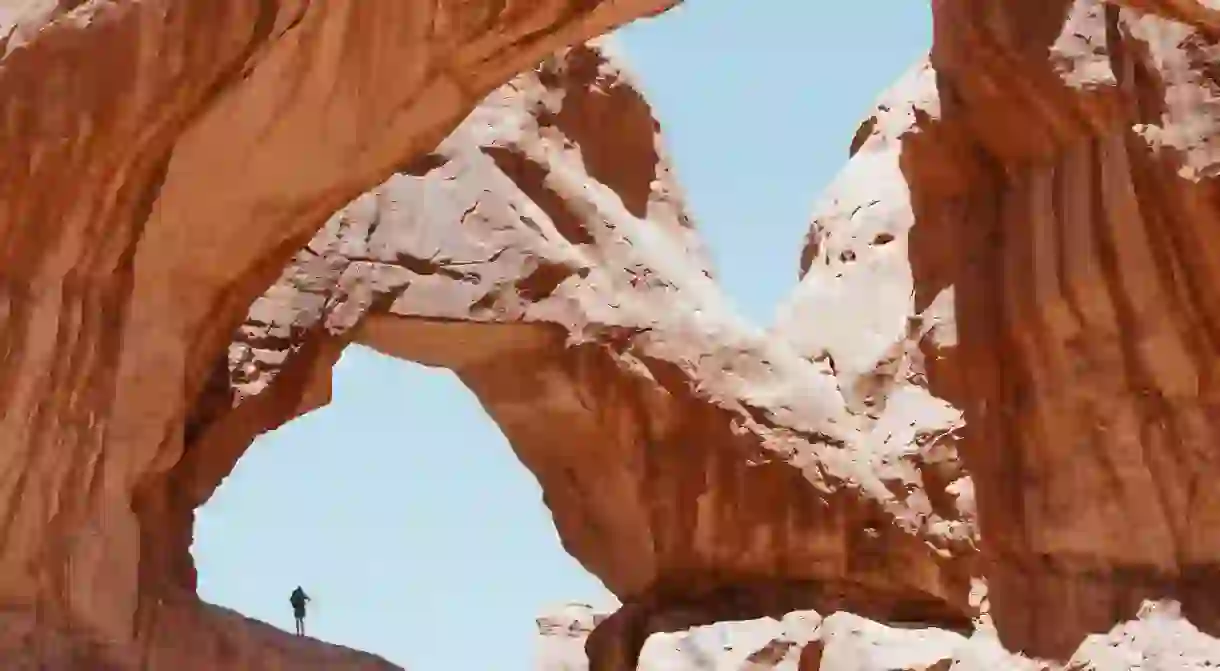Beautiful Spots You Need to Visit in Utah

Flanked by desert to the south and mountains to the north, Utah sits in the middle of the Wild West’s geological playground. Jump in the car, get on a tour bus or even hire your own RV, and get exploring the rocks, plains and majestic mountains above gulches, lakes and canyons. Culture Trip has rounded up the most beautiful spots to visit.
Did you know – Culture Trip now does bookable, small-group trips? Pick from authentic, immersive Epic Trips, compact and action-packed Mini Trips and sparkling, expansive Sailing Trips.
Many of the beauty spots featured in this list are included in our thrilling eight-day adventure through Utah and Colorado – led by a local insider to ensure you scratch beyond the surface of this breathtaking landscape.
Arches National Park
Park

Arches National Park sits in eastern Utah along the Colorado River, a mere four miles (6.4km) north of Moab. Composed of iconic red rock, the sweeping vistas are punctuated with natural stone arches, precariously balancing rocks and massive fins. Delicate Arch, perhaps the most famous site, illustrates the precious nature of these geological wonders.
Bear Lake
Natural Feature

Located on the Utah-Idaho border, Bear Lake is Utah’s second-largest natural freshwater lake. The lake’s rich turquoise-blue water has earned it the nickname Caribbean of the Rockies. Deeply wooded forests and protruding mountains imbue this area with a sense of isolated serenity. This popular summer destination also has a reputation for high-quality raspberries. See the state in style by traveling in a state-of-the-art RV – you can pick one up in Idaho or Jackson, Wyoming.
Bryce Canyon National Park
Park

The undulating landscape of Bryce Canyon punctuates Utah’s southwestern desert. Commonly referred to as a “forest of stone” or “cave without a roof”, the red, orange and white hoodoos of Bryce Canyon enchant visitors year round. The amphitheater can be traversed on horseback or on foot, while the rim provides scenic stopping points for cars.
Canyonlands National Park
Park

Another iconic Utah attraction near Moab is Canyonlands National Park. Formed by the Colorado River and its tributaries, this massive area is composed of four distinct districts. Despite being under one umbrella, each region is vast, and multiple trips are necessary to fully experience the natural wonder of Canyonlands. If you’re traveling from California, take your pick of live-in vehicles to call home for your trip – from retro campervans to state-of-the-art RVs.
Grand Staircase-Escalante National Monument
Bridge, Natural Feature

Dominating southern Utah, Grand Staircase-Escalante National Monument is a geographical formation divided into three sections: the Grand Staircase, the Kaiparowits Plateau and the Canyons of the Escalante. Tilted terraces form the staircase, vast cliffs compose the plateau, and towering faces line the canyons. While each of these multicolored geological formations is unique, they all exist in remote areas that are further punctuated by running streams and steep waterfalls.
Lake Powell
Natural Feature

Lake Powell, on the Colorado River, is the second largest man-made reservoir in America. Created by flooding Glen Canyon, Lake Powell now serves as a popular vacation destination. The world’s largest natural stone bridge, Rainbow Bridge, sits within Lake Powell’s magnificent landscape. Surrounded by sandstone walls, numerous geological layers are visible reminding visitors of the land’s rich natural history. Getting there is all part of the appeal, too, with incredible geological formations forming a continuous backdrop – best seen from behind the wheel of a bona-fide RV.
Mount Timpanogos
Forest, Park

Mount Timpanogos anchors the vistas of Utah Valley as the second highest mountain in Utah’s Wasatch Range, with peaks rising above 11,000 feet (3,350m). The jagged beauty of these peaks punctuates the sky, attracting advanced hikers and daring skiers. In addition to recreational activities, this iconic Utah mountain is home of the Timpanogos Cave National Monument, a series of three connected caves.
Park City
Park

The small town of Park City sits in the Wasatch Mountain Range, surrounded by three world-class ski resorts: Deer Valley, Park City and The Canyons. Rippling hills populated with thickly forested pines and dense aspen groves endow Park City with sweeping mountain views, rich wildlife and ample activities. Serving as an outdoor playground for both winter and summer sport aficionados, Park City’s natural beauty is accessible year round. If you’re planning on making your own way there, consider cutting costs on accommodation and hire your very own mobile home instead.
Sundance Mountain Resort

Discretely perched on the slope of Mount Timpanogos near Provo, Utah, Sundance Mountain Resort is an independently owned venture committed to the balance of art, nature and community. Purchased by actor Robert Redford in 1968, Sundance is now a year-round resort that offers alpine skiing and abundant hiking trails in addition to serving as a community for creative individuals.
Zion National Park
Park

Zion National Park enchants with a range of stunning geological formations and high animal diversity. The most prominent feature, Zion Canyon, is fifteen miles (24km) wide and a half-mile (805m) deep, attracting novice and experienced adventure seekers who hope to explore the diverse terrain. Traverse the Narrows, a gorge with a thousand footwalls, or climb up the rock formation, Angels Landing, for an aerial view of Zion Canyon. Then, pick the perfect spot to bed down for the night – maybe in one of these ultra-modern RVs.













